Vocabularies
What terminology can be generated from sonic processes and practices, and in what ways might hybrid vocabularies establish new knowledge, pathways and outcomes across disciplines?
Through each phase of LxDII, listening protocols and vocabularies have been two interlinked aspects of the research project.
They have now been brought together on our new interactive Platform for Listening Protocols and Vocabularies created by our partner Finetuned.
A significant strand of the research project is concerned with the development of vocabularies. There is a close and causal connection between what we hear or think we hear, and what we can name. If we do not have a word for the heard it cannot gain significance, it cannot enter into our imagination of the real, and cannot be the focus of any discussion on materiality, actuality and how to do things, apart from through its association with a source: ‘the sound of …'
In response, we aim to develop vocabulary-resource that brings together existing terminology on listening and hearing; that evidences differences and commonalities; that triggers new terms and interpretations; and that facilitates the discussion and application of listening and the heard across disciplines. We hope to establish an awareness towards vocabularies and their impact on the possibility of knowledge, and to create in-between disciplinary specificity and meanings, new interpretations that enable a shareable sonic sense: where one disciplinary context can reflect on and expand their tacit and esoteric processes and engagement in sound by appreciating the habits of their conventions through the discrepancy and commonality with others.
The research strand has a strong focus on the discussion, development and critical consideration of vocabularies. It is engaged in what words enable, in terms of thinking and believing, but it is also aware of what they restrict, what they shut out of a discourse or process of research and exchange. Therefore, while this project seeks to establish a useable and useful resource that can support inner- and cross-disciplinary communication and exchanges, it is also conscious of how every interpretation is always already an exclusion of another and how the writing down of meaning fixes it beyond its contingent use. It is precisely in the contingent moment of use and application, at which the inner- and cross-disciplinary exchange takes place, where we need to discuss the processes and outcomes of knowledge to truly gain the insights available. Paradoxically, this contingency needs words to realise the encounter, to tease out sonic knowledge and make it available to the cross-disciplinary exchange. Consequently, this vocabulary research is unambiguously settled at the fluid and ambiguous demand of practice, to at once have words to make and communicate the material/sonic knowledge and to challenge these words for what they cannot say.

Workshop on Vocabularies: University of the Arts, London
For this reason this project creates vocabularies on-line. It uses the fluid and participatory structures of digital thinking, knowledge and archiving to create a vocabulary that retains its own ambiguity and contradiction while being useful and able to encourage a cross-disciplinary dialogue. Thus, the vocabularies will be housed on a bespoke digital platform that accommodates the fluidity of language and meaning while giving us a sense of its contingency. We are working on a design that enables cross-reference, fluid articulations, change and adaptation, while showing the routes of disciplinary investments and histories, on which new meetings might occur. Such vocabularies are created through inner and cross-disciplinary workshopping and discussion.
We aim to emphasize practice-based approaches to words as much as possible and invite critical interventions that can generatively destabilize disciplinary meaning and bring decolonial and multi-lingual interpretations to bare on words. With this in mind we are working with the conceptual idea of building an ‘anthropology of words’, a space in which language is not only observed but productively challenged and reimagined. As part of the web platform we hope to invite writers in residence who can productively entangle and disentangle perspectives. These vocabularic experiments and the building and unperforming of terminologies, is paralleled with and enables the production of listening protocols, which is the other main outcome of this research.
Project partner Holger Schulze discusses vocabularies (excerpt from our podcast series).






